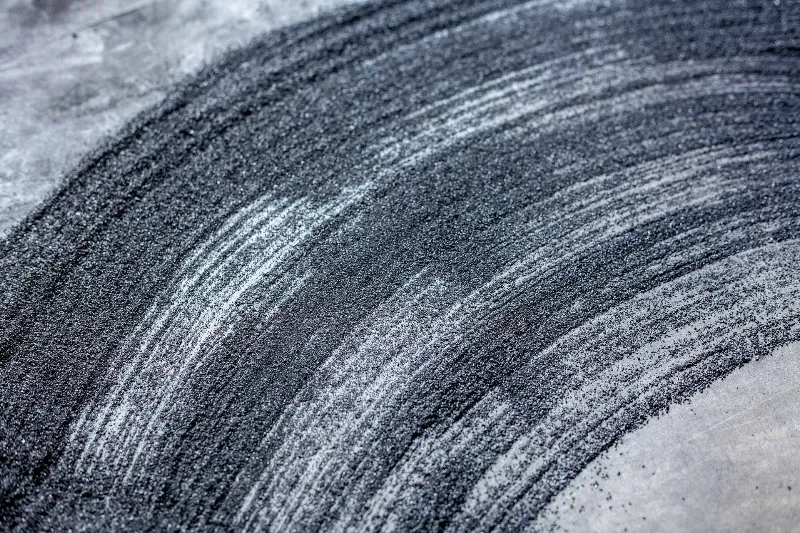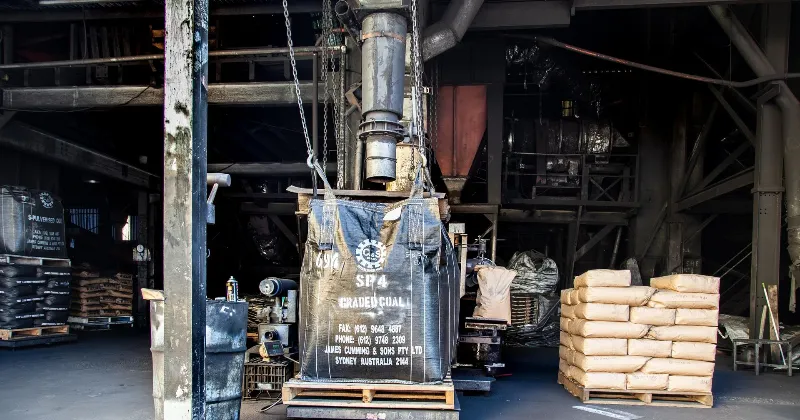Achieve consistent glass colourisation with our C&S Brand Australian industrial graded carbon
Enhance your glass manufacturing process with our Australian Coal for Glass Colourisation, specifically designed for use in glass furnaces during glass bottle production. This high-quality coal controls colour variation to create uniform shades from brown to green while maintaining efficiency and reliability. With consistent particle sizing, low inherent moisture and a dependable fixed carbon content, our industrial graded carbon delivers optimal performance for precise glass colourisation.
For a quote or to request a data sheet for raw materials like industrial graded coal, reach out to our team or explore our product information today.

Product description
Our premium industrial graded coal plays a pivotal role in glass furnaces during bottle production, controlling colour (from brown to green) and minimising variations. This coal features precise and uniform particle sizing for optimal combustion and consistent heat distribution. With a fixed carbon content of at least 55% and low inherent moisture (maximum 3.5%), it delivers dependable energy output while minimising moisture-related inefficiencies.
Rigorous quality control provides a cost-effective and reliable solution for glass colourisation. We collaborate with fellow manufacturers to tailor product sizing for your specific application needs.
In glass manufacturing, our industrial graded coal is used extensively in bottle production to achieve consistent and precise colouration. Its ability to control heat distribution allows for uniformity in the final product, ideal for high-volume glass furnace operations.
Beyond bottle production, it can also be applied in processes that require stable and efficient heat generation, such as ceramic kilns and certain metallurgical applications. The adaptability of premium graded coal makes it a versatile choice for industries requiring precise thermal control and reliable performance.
Specification (Typical)
| Sieve Size (Metric) | BSS % | Retained % | Passing |
| 1.0 mm | 16# | 1.4 | 98.6 |
| 600 micron | 25# | 31.8 | 31.8 |
| 250 micron | 60# | 64.0 | 3.6 |
| 150 micron | 100# | 2.8 | 0.8 |
| 75 micron | 200# | 0.6 | 0.2 |
| Pan | 0.2 | 0.0 |
Sizing (Guaranteed)
2% Maximum retained on 16# (1.0 mm)
3% Maximum passing 200# (75 micron)
Fixed Carbon Content
55% minimum to AS1038.3
Volatile Matter:
24-28%
Ash:
12-14%
Inherent Moisture Content
3% maximum to AS1038.3
Description:
Fine clean black granules

Packaging
- We carefully package carbon for glass colourisation in pallets with 48 multiwall paper sacks, each weighing 22.5kg, shrink-wrapped.
- Alternatively, you can opt for 900kg or 1000kg woven polypropylene bulk bags, which feature a bottom spout discharge and four lifting lugs positioned on the top for ease of handling. Enquire for customised packaging options.
Projects
Dungog WTP
This was the first contact filtration plant in Australia to use large effective size media, after pilot plant work by the Hunter Water Corporation. It was also the first to use C & S Brand Australian Filter Coal and remains an industry frontrunner with long-term results, durability and consistency.
FAQs
What is C&S Brand Australian Graded Coal and its key characteristics?
Australian graded coal is a high-quality bituminous coal characterised by specific properties ideal for specialised industries like glass bottle production. These properties include:
- High calorific value: This means it releases a significant amount of heat when burned, making it efficient for energy-intensive processes.
- Low ash content: Lower ash content reduces the amount of residue left after combustion, which improves efficiency and reduces maintenance requirements.
- Low sulphur content: Low sulphur content minimises harmful emissions and environmental impact.
- Consistent quality: Premium graded coal maintains a consistent level of quality in terms of its chemical composition and physical properties.
- Specific size and shape: The coal is often crushed and sized to specific dimensions to optimise its use in glass colourisation applications.
These characteristics make Australian Graded coal a valuable resource for industries that require a reliable and efficient colour additive. Conversely, standard grades of coal have varying levels of impurities and inconsistent quality. They are less suitable for precision-dependent applications like glass production and ceramics manufacturing.
What industries use industrial graded coal?
Our premium graded coal is useful in industries that require consistent energy output and controlled combustion characteristics. Some of the key industries that rely on premium graded coal include:
- Glass manufacturing — The glass industry uses coal to heat furnaces for melting raw materials, and industrial graded coal is often chosen for its consistent heat output and low emissions.
- Steel industry — The steel industry uses coal as a reducing agent in the smelting process, and premium graded coal is preferred for its high heat content and low impurities.
- Cement production — Coal is used to heat kilns in cement production, and premium coal can improve the efficiency of this process.
- Other industries — Other industries, such as, ceramics, friction, paper and textile manufacturing, may also use industrial graded coal for specific heating and energy needs.





















